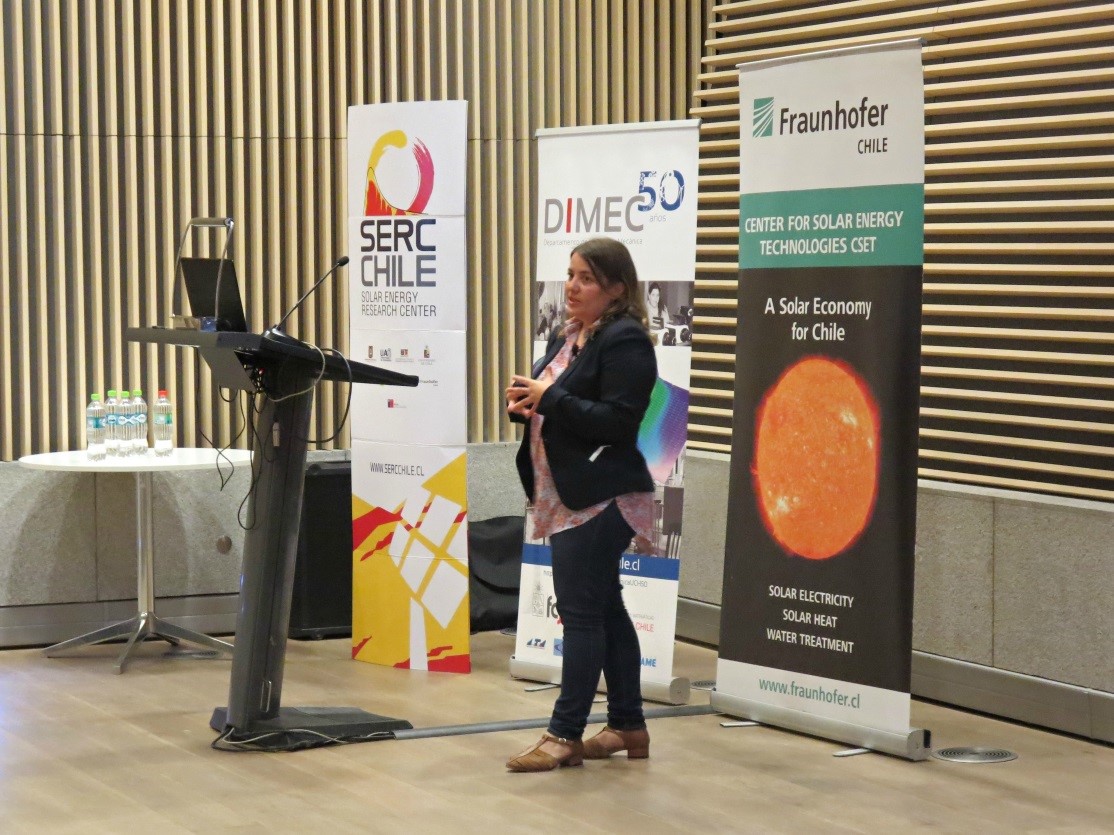Fraunhofer CSET realizes seminar on Solar Technologies for Heat Supply in Industrial Processes
The Center for Solar Energy of Fraunhofer Chile Research (FCR-CSET) together with SERCChile and DIMEC organizes a seminar on solar thermal systems
The seminar, held last Friday, December 7 at the D'Etigny Auditorium of the Faculty of Physical and Mathematical Sciences of the University of Chile, was jointly organized by FCR-CSET (Fraunhofer Chile Research with its Center for Solar Energy Technologies), SERCChile (Solar Energy Research Center) and DIMEC (Department of Mechanical Engineering), to address the topic "solar thermal systems".



With a large audience (approximately 130 people), closed the conference of instructive talks on solar technologies for heat supply in industrial processes. The use of fossil fuels in industry is about to end. It is currently being studied to replace the polluting energy sources with renewable energy sources. In this instance, experts in solar technology presented the challenges in the implementation and integration methodologies. In addition, the great potential of solar thermal energy was highlighted in the new perspectives, which point to developments and transformations.
The seminar had an outstanding panel of Chilean experts, such as Dr. Mercedes Ibarra (FCR-CSET) who spoke about "the challenges of integrating solar energy into industrial processes". The integration of solar processes is a fundamental aspect, where different integration schemes exist, that may be appropriate in this equivalent case. This requires knowledge of the various industrial processes and the dynamics of operation. The final design must be done in collaboration with the industry to ensure proper integration in the workflow.
Alfredo González of Aiguasol spa. talked about the "Potential for the Application of Solar Energy in Thermal Industrial Processes in Chile". He showed studies and industrial processes that Chile has in the Solar Thermal Energy sector, where he delved into an interesting project that was initialized with the help of Corfo, called Appsol—Applications of solar thermal energies. Finally, he affirmed the importance of reducing costs in energy matters to improve the competitiveness of the Chilean industry.
The seminar continued with "The New Perspectives in Residential and Commercial Thermal Solar Energy" presented by Gerardo Díaz of UC Solar- University of California at Merced. Gerardo Díaz confirmed climate change and its consequences in the coming years. He invited us to see outside the comfort zone and as well highlighted that "We are reaching 1.5 degrees Celsius of climate warming, if there are no significant reductions in CO2 emissions. Fulfilling this objective requires extraordinary transformations in transportation, energy, land use, infrastructure and industrial systems. "
Miguel Frasquet of SolAtom illustrates and develops the question: How can the traditional model of Solar Energy be transformed into industrial processes and make it competitive in SMEs? In his presentation, he reflected on the importance of the SOLATOM project, a startup to save on an efficiently and sustainably way for the industry.
The program continued with José Miguel Cardemil from DIMEC University of Chile and his presentation on the "Development of a volumetric receiver for high temperature air for industrial heat". The plants currently in operation are located in Germany, Korea and Chile; where CSP (Concentrating Solar Power) is used for co-generation and process heat.
Rafael Guedez from KTH Sweden explained, "CSP is a proven technology and with continuous technological development. The design of a CSP system with storage is adaptable to the requirements of the process. There are different sub-systems, available technologies and applications depending on the process. He assures that "The potential in Chile is immense", there is solar resource, trained industry and demand. To accelerate the penetration of the CSP in Chile it is necessary to establish strategic alliances between industry, university and government and to collaborate with diverse international actors."
Dr. Mercedes Ibarra, expert in Solar Thermal Energy at Fraunhofer Chile CSET, closed the seminar by pointing out the difficulties presented by the industry and that it is important to improve, as well the lack of confidence in the integration of new solar thermal technologies, especially the processes. Another important gap is the low cost of fossil fuels. In this case, a solution could be the price increase (CO2 tax) or renewable quotes.
The objective of Fraunhofer Chile CSET is innovation to achieve solar energy on a large scale in Chile for the most important industrial, commercial and residential areas.
 Fraunhofer Chile Research
Fraunhofer Chile Research